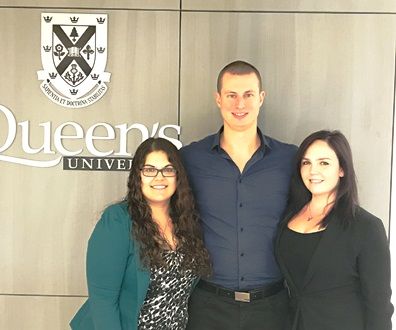
This year marks another milestone for the Queen’s Law Clinics (QLC): the hiring of the most articling students in its history. Since Queen’s Law’s five clinics were brought together in downtown Kingston in 2015, demand for all their services has increased significantly. Three full-time articling students, all Law’17 alumni, are needed to provide legal services to clients and to mentor student caseworkers.
“Increasing our articling program from one to three students and expanding it to include all the clinics is a mark of how we are thriving,” explains Karla McGrath, LLM’13, Executive Director of QLC. “The articling students are a great resource for staff and students alike. They increase our ability to both serve clients and teach students by providing the student caseworkers with an added layer of oversight and mentorship.
“They have graduated and so take on increased responsibility in these new roles and they have added maturity and experience that is invaluable to the more than 150 law students working at the clinics throughout the year.”
Mike Adamek is working for Queen’s Legal Aid (QLA) and the Queen’s Business Law Clinic (QBLC). Sarah Jane Black is articling for QLA and the Queen’s Family Law Clinic (QFLC). Finally, Kayla Touma Zagwolski works with the Queen’s Prison Law Clinic (QPLC). Throughout their articling experience they will all be getting hands-on experience building a diverse collection of crucial legal skills, including litigation.
“At QLA my files are heavily litigation-based, involving areas such as landlord/tenant disputes, civil claims and criminal offences, among many others,” explains Adamek. Meanwhile, Black has already done a criminal trial. “We can represent clients as long as they are not facing jail time. We also do provincial offences and a lot of tribunal work such as the Ontario disability support program and landlord/tenant disputes,” she says.
Zagwolski will have a special focus on clients with mental health concerns in her work for the QPLC. “I meet with clients, help them prepare for various hearings such as post-suspension, parole and detention reviews, as well as represent them at these hearings. I also represent clients in disciplinary court (internal courts within the prisons) and assist with filing grievances for any serious concerns our clients are facing.”
The articling positions will also provide essential experience in relating with clients, as well as in the drafting and filing of documents. “I will be helping vulnerable self-represented litigants navigate the complex Family Court system, ensuring they meet the strict requirements expected of them,” says Black. Adamek will help grow small businesses and not-for-profits with the QBLC. “There is a similar variety as with QLA files, everything from incorporation, to reviewing contracts, to trademark protection.”
Adamek has worked with QLA since his first year of JD studies. “I can say confidently that the clinic was my favorite experience in law school,” he says. “I learn best by doing so it was the ideal chance to help others while developing practical skills.”
“I worked for the Queen’s Prison Law Clinic during both my second year of law school and the summer before I entered my third year,” says Zagwolski. “It helped show me that I did wish to pursue litigation as part of my career and gave me my first exposure to the solicitor-client relationship.”
Why article for the QLC? The three students-at-law give a variety of different reasons for making this choice. For Black, the responsibility given to her right from the get-go was key. “I don’t know any other articling students who are running a criminal trial a month into their articling. (She won that first trial.) “The supervising lawyers give us the reigns to do everything that we will be doing when we start to practise law. Anyone who is able to work in these clinics will have a foot up when they enter the working world, especially if they want to go out on their own.”
Zagwolski and Adamek emphasize the collegial workplace environment. “I was drawn to working with different client personalities and legal issues in a cooperative, deeply hands-on environment, where I’ve grown extremely comfortable over the last three years,” says Adamek. “I enjoyed my work with them tremendously in the past,” says Zagwolski. “I believe that creating access to justice for vulnerable populations is an important part of our legal system and free clinics do just that, they assist those that normally fall through the cracks.”
Embracing mentorship opportunities is part-and-parcel of the positions. Zagwolski knows how difficult entering a prison can be for the first time. “I hope to help caseworkers ease into the situation and to ensure them that I’m here to answer any questions they may have.”
“As articling students, we receive close guidance from many different lawyers,” adds Adamek. “Meanwhile, we’re trusted as one of the primary resources to helping other caseworkers. We end up with a truly pay-it-forward spirit when it comes to mentorship.”
By Anthony Pugh